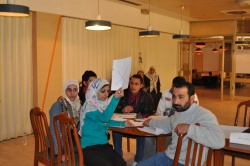Never too Young for Peace
Recognizing the potential role of youth as catalysts of social change, USIP's Iraq Grant Program partners with a number of youth organizations to promote peacebuilding and conflict resolution, and strengthen tolerance and mutual understanding in Iraqi communities that continue to experience high levels of intergroup conflict.

September 12, 2011
Youth in Iraq are especially vulnerable groups to violence and political turmoil. They also face other challenges such as high rates of poverty, school dropout, unemployment and a lack of recreational programs, inhibiting the capacity of Iraqi youth to develop into future leaders of their country. As a result, young people often feel marginalized, frustrated and powerless. They are also prone to abuse and exploitation by extremist groups and organized crime gangs. These abuses are often overshadowed by the more heavily publicized issues of terrorism and insurgency.
Recognizing the potential role of youth as catalysts of social change, USIP's Iraq Grant Program partners with a number of youth organizations to promote peacebuilding and conflict resolution, and strengthen tolerance and mutual understanding in Iraqi communities that continue to experience high levels of intergroup conflict.
In Al-Anbar province, a USIP grant permitted a local nongovernmental organization (NGO) to implementa much-needed youth empowerment program. The NGO - which cannot be named due to security concerns- trained youth in principles of citizenship, human rights and peaceful coexistence, and equipped them to resolve conflicts peacefully. However, the task of running this type of training in Al-Anbar was not as easy as the NGO had thought.
Traumatized by war and al-Qaida's violent presence, the local communities in Al-Anbar were fearful of and mistrusted civil society organizations. Conservative tribal leaders expressed suspicion about an NGO that proposed to include both boys and girls in its activities. To overcome these hurdles, the NGO staff employed culture-sensitive techniques to gain the community's trust and support. They invited the son of the Al-Anbar governor to participate in one of the workshops - which attracted the attention of the larger community and the media. Al-Anbar's official newspaper covered the activities of the workshop, and, with the governor's support, continued to cover other activities of the organization.
 With this newfound community support, the training was a success. It brought together 144 young men and women for targeted training-of-trainers workshops on peacebuilding and conflict resolution. The trainees, who hailed from six districts in Al-Anbar, then provided follow-on training to a total of 1,440 young men and women in their respective districts. In the course of the training program, the youth leaders underwent a significant attitudinal transformation. Some initially felt apprehensive about the purpose of the training, while others had mixed negative views about Iraq's government, religious sects, minorities, as well as their future as the country's next generation of
With this newfound community support, the training was a success. It brought together 144 young men and women for targeted training-of-trainers workshops on peacebuilding and conflict resolution. The trainees, who hailed from six districts in Al-Anbar, then provided follow-on training to a total of 1,440 young men and women in their respective districts. In the course of the training program, the youth leaders underwent a significant attitudinal transformation. Some initially felt apprehensive about the purpose of the training, while others had mixed negative views about Iraq's government, religious sects, minorities, as well as their future as the country's next generation of
leaders. But, they emerged with more balanced views about diversity, how peace and tolerance is beneficial, and how to use conflict resolution effectively in their local community. There was also a significant participation of young women in the training, at a ratio of seven female participants to 10 male participants.
Ultimately, the training project, titled "Youth Peace Heralds and Messengers," received strong support from the community in Al-Anbar. Its success opened the door for the organization to collaborate with another local NGO to train a group of policemen and other security personnel and launch a joint initiative designed to reduce tensions between youth and security officers. The initial USIP grant also paved the way for the organization to receive a grant from the National Endowment for Democracy to conduct a project on human rights monitoring, and from the National Democratic Institute to develop larger scale youth projects.
The youth's efforts also culminated in the creation of a young adult peace club, which was requested by the youths' parents. Given the initial skepticism and mistrust of the community, this change in parental attitudes toward a co-ed training program represents a significant success. The young peaceenthusiasts and their parents continue to carry out activities in their local schools and neighborhoods and aim to establish themselves as a young adult NGO. One of the parents, expressed pride in her son's achievements: "I couldn't believe that my son was capable of carrying out an awareness workshop by himself. The peaceful conflict resolution training has changed him forever." The young messengers of peace will work on designing a "peace monument" to be built in one of the city's public parks. Their passion and dedication proved that in Iraq, no one is too young for peace.



